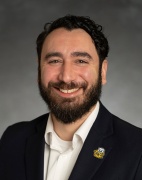Electives
25%
Our curriculum
Our Master of Public Policy curriculum is rigorous, interdisciplinary, and hands-on.
- Policy analysis: The Ford School is the national recognized leader in quantitative policy analysis, with a carefully-sequenced core curriculum in microeconomics, statistics, and quantitative program evaluation.
- Political and ethical analysis: Core courses teach a sophisticated understanding of public policy institutions and political processes and also explore the key role of values and ethics in public policy design.
- Communication: We offer outstanding writing instruction and tutoring; skills modules in public presentation, social media, strategic communication, working with the press, data visualization; and more.
- Leadership: Core and elective courses focus on key issues in public/nonprofit management and effective leadership. Numerous co-curricular leadership development opportunities are also available, including leadership assessments; workshops; panels; access to top policymakers; executive coaching; and serving in leadership roles in student orgs, schoolwide committees, and public service initiatives.
Core curriculum learning objectives
Master of Public Policy students will:
- acquire and demonstrate analytic skills necessary for successful policy analysis
- develop a sophisticated understanding of public policy institutions and processes (broadly defined to include economic, political, and other)—and the implications these have for policy development and implementation
- develop, practice, and refine communication skills appropriate to the policy arena
- develop and refine leadership, management, and decision-making skills
- demonstrate ability to integrate analytic, institutional, communication, and management skills
Integrated in several core courses in the curriculum is increased attention to structural racism/institution discrimination, and the historical and current role of public policy in both addressing and also reinforcing/codifying structural racism and social inequalities.
Core coursework
All MPP students who enroll starting in fall 2025 and later are required to complete the following core courses (24.5 credits):
- Politics of Public Policy (PubPol 510, 3 credits)
- Statistics (PubPol 529, 3 credits)
- Microeconomics for Public Policy (PubPol 555, 3 credits) and one of the following courses:
- PubPol 558: Economic Analysis in the Practice of Public Policy (3 credits)
- PubPol 534: Economics of Developing Countries (3 credits)
- PubPol 556: Macroeconomics (3 credits)
- PubPol 744: Economics and the Public Sector (3 credits)
- Values, Ethics, and Public Policy (PubPol 580, 3 credits)
- Public Management (PubPol 588, 3 credits)
- Integrated Policy Exercise (PubPol 638, 1 credit)
- Quantitative Methods of Program Evaluation (PubPol 639, 3 credits)
- Negotiations or Conflict Resolution (PubPol 583 or 589, 1.5 credits)
- MPP Integrated Learning Experience (PubPol 500, 1 credit)
Please note:
- Students with preparation in statistics and/or microeconomics may waive PubPol 529 and/or PubPol 555 respectively by passing waiver exams that are offered during orientation.
- If you are waived from a core course, you must complete an additional elective Ford School course. Waived courses are not counted toward the 48 credits required for the degree.
- The Ford School follows the Rackham Graduate School's policy on the assignment of credit hours.
Electives
Ford School electives include courses on the history and future of Detroit; the economics of developing countries; strategic consulting; the psychology of climate change; smart cities and mobility; thinking about crime, poverty and inequality; cybersecruity policy; the economics of education; and more.
With low administrative barriers between schools, students can easily combine their policy courses with electives offered by the U-M's outstanding professional schools—including law, business, education, and urban planning—and top-ranked social science departments. One quarter of Ford School credits can be taken outside of the school.
Internship
The required internship between the first and second year of study sends MPP students around the world to work on critical issues in their policy areas of interest. We help students find internships with an impressive range of domestic and international employers, and we offer generous stipends when needed.
Policy concentrations
Students gain depth in an area of interest and passion through optional policy concentrations, which require 9-12 credits and are formally recognized on transcripts. We offer policy concentrations in 7 core Ford School strengths:
Public policy analysis methods
Faculty lead: Brian Jacob
Focus: Applied methods and skills for rigorous policy analysis and research
Requirements: 9 credits; PubPol 774 or 779 plus 6 additional credits
Public and non-profit management
Faculty lead: Megan Tompkins-Stange
Focus: Knowledge and skills related to the operation, management and leadership of public and non-profit organizations
Requirements: 6 credits beyond 586/587 requirement in the core curriculum
Social policy
Faculty lead: Paula Lantz
Focus: Knowledge and policy analysis skills related to key areas of social policy
Requirements: 9 credits; no required courses
International policy
Faculty lead: Jonathan Hanson
Focus: Knowledge and policy analysis skills related to diplomacy, national security, human rights
Requirements: 12 credits
Strongly Recommended: International affairs or comparative politics section of PubPol 510: Politics of Public Policy
International economic development
Faculty lead: Yusuf Neggers
Focus: Knowledge and policy analysis skills related to economic and social development
Requirements: 9 credits; PubPol 534 plus 6 additional credits
Science, technology, and public policy
Faculty lead: Shobita Parthasarathy
Focus: Knowledge and policy analysis skills related to technology, science, public policy, and society
Requirements: 9 credits; PubPol 650 plus 6 additional credits
Environmental, climate, and energy policy
Faculty Lead: Catie Hausman
Focus: Knowledge and policy analysis skills related to key areas of environmental, climate, and energy policy
Requirements: 9 credits; no required courses
Learn more about our policy concentrations.





